New School at Kinistin Reserve to Open This Fall
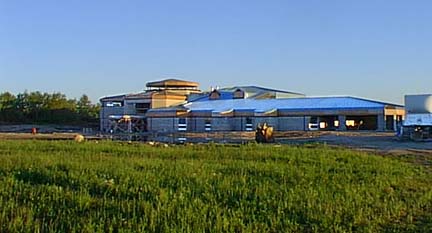
by Timothy W. Shire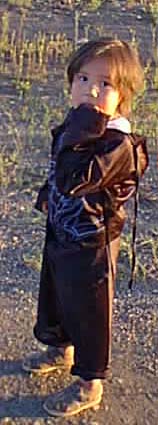
Kinistin Nation (FTLComm) - June 22, 1998 Located in the beautiful
rolling hills and bush land midway between McKague and Pleasantdale the Kinistin
Saulteaux Nation is one of Saskatchewan’s smaller reserves. The children from the
reserve from kindergarten to grade nine attend school in three houses and other portable
buildings. Classroom teachers are busy now, as the school year draws to a close,
packing up their materials in preparation for moving into their new building for
the fall term. About fifteen high school students make the bus trip to Pleasantdale
each day to attend high school, while others, (young adults) attend adult upgrading
in Melfort. The move to the new school in the fall will start a new era for the reserve
with the young people of the community able to attend all of their elementary and
high school right at home. The experience on other reservers has shown that a higher
number of students will stay in school longer when attending school within their
own community. Three of the present school’s teachers are from the Kinistin reserve.
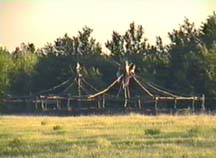 The people formerly referred to as the “Saulteaux”
are the most Westerly nation of the Five Nations peoples of East Central Canada.
Iroquois, Algonquin, Huron, Mohawk and Ojibwa
were among the first people to sign formal treaties with the King of England and
all five had a long tradition of democratic self government. The Ojibwa ranged
within the wooded area of North Western Ontario, Southern Manitoba and along the
park land across Saskatchewan. Most of the people along the Qu' Appelle Valley including
Kakawistaha, Ochapawas, Cowessess and Sakimay are Anicanabe
(preferred name for this group today) but other reserves like the ones near Kamsack
and the White Bear at Carlyle are also Anicanabe. Over the years there have
been some inclusion on these reserves of some Cree and in the case of the
White Bear, Dakota refugees who also joined with the people of Carry
the Kettle and Mosquito reserves.
The people formerly referred to as the “Saulteaux”
are the most Westerly nation of the Five Nations peoples of East Central Canada.
Iroquois, Algonquin, Huron, Mohawk and Ojibwa
were among the first people to sign formal treaties with the King of England and
all five had a long tradition of democratic self government. The Ojibwa ranged
within the wooded area of North Western Ontario, Southern Manitoba and along the
park land across Saskatchewan. Most of the people along the Qu' Appelle Valley including
Kakawistaha, Ochapawas, Cowessess and Sakimay are Anicanabe
(preferred name for this group today) but other reserves like the ones near Kamsack
and the White Bear at Carlyle are also Anicanabe. Over the years there have
been some inclusion on these reserves of some Cree and in the case of the
White Bear, Dakota refugees who also joined with the people of Carry
the Kettle and Mosquito reserves.
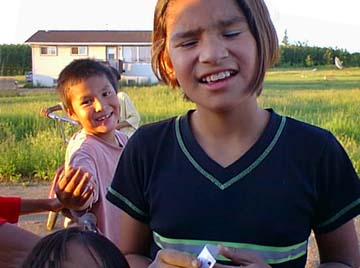 The Anicanabe culture has a long and well established
cultural heritage that included affinity groups with in the people referred to as
“clans”. These “clans” are not necessarily family groupings as we might identify
with the Scot clans, but rather might be more associated with the european lodges
and guilds (ie, Masons and Odd Fellows) though far more nature and spiritually connected.
The Anicanabe culture has a long and well established
cultural heritage that included affinity groups with in the people referred to as
“clans”. These “clans” are not necessarily family groupings as we might identify
with the Scot clans, but rather might be more associated with the european lodges
and guilds (ie, Masons and Odd Fellows) though far more nature and spiritually connected.
Every community, reserve or otherwise, has its occasional difficulties, when a youth
worker who works with young people on the Kinistin Reserve, was asked if alcohol
abuse was a problem affecting the community’s youth, his response was quite remarkable.
He explained that what worried him more then anything, was the huge numbers of people
who focused so much of their time and energy on Bingo. He said that it was a disturbing
and disruptive influence on the families of the community and substantially affected
the problems young people had, simply because of their parents being absent so much
of the time.
Canada’s reservations, coast to coast, have a large number of  commonly shared difficulties. The
birth rates are healthy and in general the population is expanding, but housing is
a limited commodity, forcing extended families to share the same dwelling so that
it is not unusually to find ten to fifteen people sharing a single three bedroom
dwelling. This kind of concentration of people puts everyone under a lot of pressure
producing some unusually results. Young people are reluctant to go home at night,
they have problems doing homework, domestic violence can flair up easily and with
large numbers of people in a single household if one of them has a cold or is in
a bad mood everyone is affected.
commonly shared difficulties. The
birth rates are healthy and in general the population is expanding, but housing is
a limited commodity, forcing extended families to share the same dwelling so that
it is not unusually to find ten to fifteen people sharing a single three bedroom
dwelling. This kind of concentration of people puts everyone under a lot of pressure
producing some unusually results. Young people are reluctant to go home at night,
they have problems doing homework, domestic violence can flair up easily and with
large numbers of people in a single household if one of them has a cold or is in
a bad mood everyone is affected.
In driving around Kinistin it looks like the band is making a solid effort with the
funds available to create good housing for the people of the reserve with a good
number of recent modern homes. The opening of the new school will have a positive
affect on the community, as it will serve as a focal point for community activities
and a source of pride for everyone.



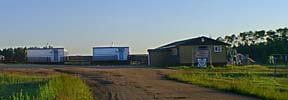

 The people formerly referred to as the “Saulteaux”
are the most Westerly nation of the Five Nations peoples of East Central Canada.
Iroquois, Algonquin, Huron, Mohawk and Ojibwa
were among the first people to sign formal treaties with the King of England and
all five had a long tradition of democratic self government. The Ojibwa ranged
within the wooded area of North Western Ontario, Southern Manitoba and along the
park land across Saskatchewan. Most of the people along the Qu' Appelle Valley including
Kakawistaha, Ochapawas, Cowessess and Sakimay are Anicanabe
(preferred name for this group today) but other reserves like the ones near Kamsack
and the White Bear at Carlyle are also Anicanabe. Over the years there have
been some inclusion on these reserves of some Cree and in the case of the
White Bear, Dakota refugees who also joined with the people of Carry
the Kettle and Mosquito reserves.
The people formerly referred to as the “Saulteaux”
are the most Westerly nation of the Five Nations peoples of East Central Canada.
Iroquois, Algonquin, Huron, Mohawk and Ojibwa
were among the first people to sign formal treaties with the King of England and
all five had a long tradition of democratic self government. The Ojibwa ranged
within the wooded area of North Western Ontario, Southern Manitoba and along the
park land across Saskatchewan. Most of the people along the Qu' Appelle Valley including
Kakawistaha, Ochapawas, Cowessess and Sakimay are Anicanabe
(preferred name for this group today) but other reserves like the ones near Kamsack
and the White Bear at Carlyle are also Anicanabe. Over the years there have
been some inclusion on these reserves of some Cree and in the case of the
White Bear, Dakota refugees who also joined with the people of Carry
the Kettle and Mosquito reserves. The Anicanabe culture has a long and well established
cultural heritage that included affinity groups with in the people referred to as
“clans”. These “clans” are not necessarily family groupings as we might identify
with the Scot clans, but rather might be more associated with the european lodges
and guilds (ie, Masons and Odd Fellows) though far more nature and spiritually connected.
The Anicanabe culture has a long and well established
cultural heritage that included affinity groups with in the people referred to as
“clans”. These “clans” are not necessarily family groupings as we might identify
with the Scot clans, but rather might be more associated with the european lodges
and guilds (ie, Masons and Odd Fellows) though far more nature and spiritually connected. commonly shared difficulties. The
birth rates are healthy and in general the population is expanding, but housing is
a limited commodity, forcing extended families to share the same dwelling so that
it is not unusually to find ten to fifteen people sharing a single three bedroom
dwelling. This kind of concentration of people puts everyone under a lot of pressure
producing some unusually results. Young people are reluctant to go home at night,
they have problems doing homework, domestic violence can flair up easily and with
large numbers of people in a single household if one of them has a cold or is in
a bad mood everyone is affected.
commonly shared difficulties. The
birth rates are healthy and in general the population is expanding, but housing is
a limited commodity, forcing extended families to share the same dwelling so that
it is not unusually to find ten to fifteen people sharing a single three bedroom
dwelling. This kind of concentration of people puts everyone under a lot of pressure
producing some unusually results. Young people are reluctant to go home at night,
they have problems doing homework, domestic violence can flair up easily and with
large numbers of people in a single household if one of them has a cold or is in
a bad mood everyone is affected.